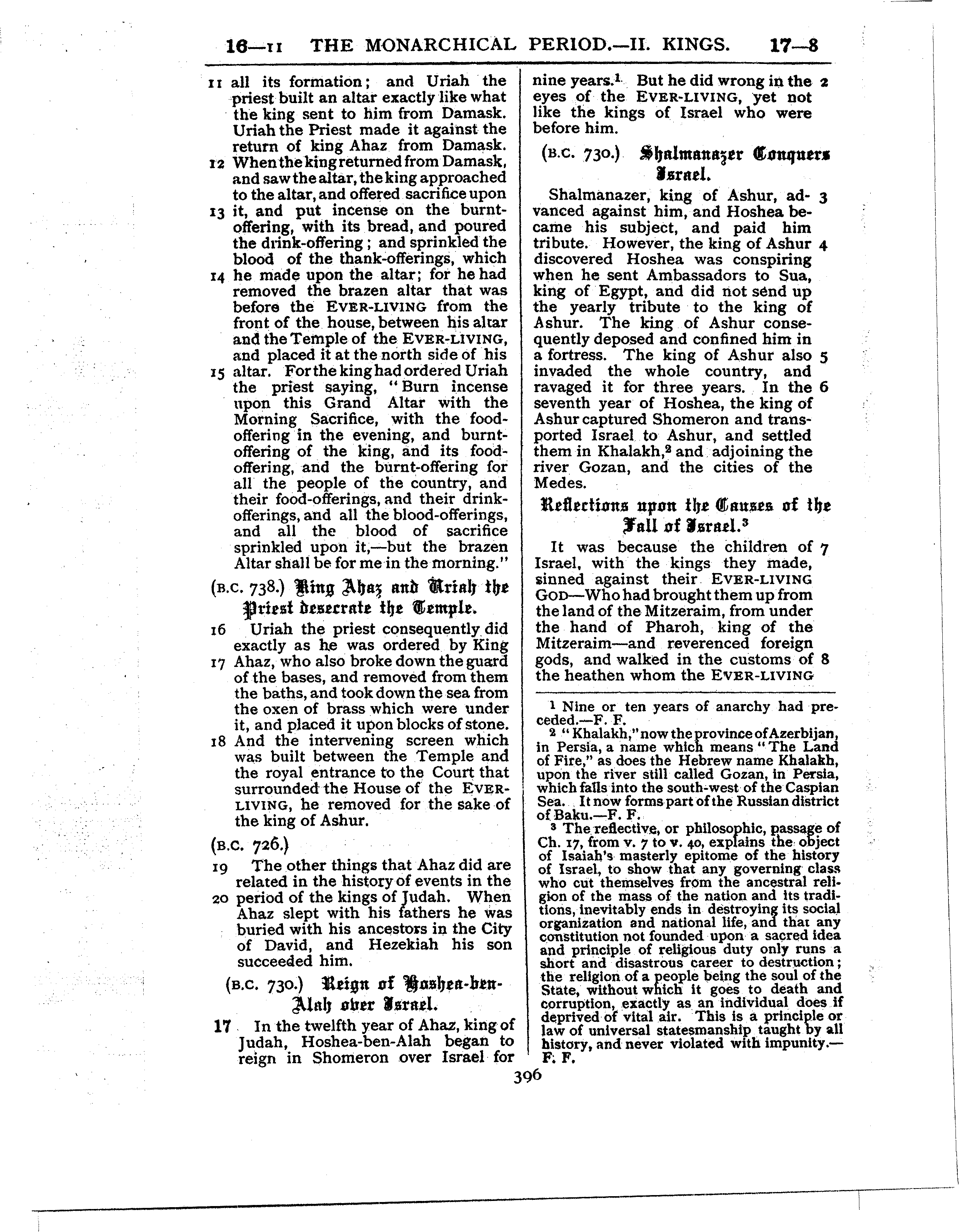II Kings - Ferrar Fenton Bible Translation page 396
The History of the People of Israel
exactly as he was ordered by King Ahaz, who also broke down the guard of the bases, and removed from them the baths, and took down the sea from it, and placed it upon blocks of stone. the oxen of brass which were under And the intervening screen which was built between the Temple and the royal entrance to the Court that surrounded the House of the EVER- LIVING, he removed for the sake of the king of Ashur. (sc. 726.) xg The other things that Ahaz did are related in the history of events in the period of the kings of tjudah. Wh€n Ahaz slept with his athers he was buried with his ancestors in the City of David, and Hezekiah his son succeeded him. (ac. 73o.) Qzigzt nf §¤sl1r¤-l¤2¤- wal; utter Israel. 17 . In the twelfth year of Ahaz, king of judah, Hoshea-ben-Alah began to reign in Shomeron .over Israel- for nine years}; But he did wrong in the z eyes of- the EVER-LWING, yet not like the kings of Israel who were before him. (B-G- 73¤·)· §ba1mmm;zr dnnquzrx israel. Shalmanazer, king of Ashur, ad- 3 vanced against him, and Hoshea be- came his subject, and paid him tribute. However, the king of Ashur 4 discovered Hoshea was conspiring when he sent Ambassadors to Sua, king of Egypt, and did not send up the yearly tribute to the king of Ashur. The king of Ashur conse- quently deposed and confined him in a fortress. The king of Ashur also invaded the whole country, and ravaged it for three years. _ In the seventh year of Hoshea, the king of Ashur captured Shomeron and trans- ported Israel, to Ashur, and settled them in Khalakh} and adjoining the river, Gozan, and the cities of the Medes. itzdzrtzuna npmt the dairses nf the Tall uf israel. It was because the children of 7 Israel, with the kings they made, sinned against their. EVER-Livmo GoD·~Who had brought them up from the land of the Mitzeraim, from under the hand of Pharoh, king of the Mitzeraim-—-—and reverenced foreign gods, and walked in the customs of 8 the heathen whom the EVER-LIVING Nine or ten years of anarchy had pre· ceded.·-—F. F. Khalakhfnow the province of Azcrbijan,
The Land asgdoes the Hebrew name Khalakh, upon the river still called Gozan, in Persia, which failscinto the south=west· of the Caspian Sea. . , It now forms-part of the Russian district of Baku.-—F. F. I 3 The·redectiveor hilosoh _, ppic, passage of Ch. 17, from v. 7 to v. 4o, exp ains the o. ject of Isaiab’s- masterly epitome of the history of Israel, to show that any governing class who out themselves from the ancestral reli- gion of the mass of the nation and its tradi- tions, inevitably ends in destroying its social organization and national life, an that any constitution not founded upon a sacred idea and principle of religious duty only runs a short and disastrous career to destruction; the religiorioof a Ecople being the soul of the State; withoutw ich it goes to death and corruption, exactly as an individual does if f vital ir. This is a rinoi deprived-oapge or law of universal statesmanship xaught y all gisgsry, and- never violated with impunity. 396
